| Srl | Item |
| 1 |
ID:
120672
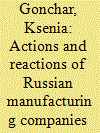

|
|
|
|
|
| Publication |
2013.
|
| Summary/Abstract |
This essay explores the nature of the 2008 crisis and the channels through which it affected the performance of firms in Russia. Based on the findings of a manufacturing industry survey, the evidence suggests that all manufacturing firms were affected by the crisis and that there is no single and dominant transmission channel. Crisis reactions were significantly related to participation in international markets, although participation in trade, in external borrowing or FDI cannot explain recession by themselves. The reversal of growth was mainly caused by demand shock and, following that, by financial constraints. Thus the hypothesis that blames overheating of internal demand in the years prior to the crisis seems to receive statistical backing. Globalised companies, though hit by external shocks, were better prepared to pay the cost and balance the consequences of the crisis.
|
|
|
|
|
|
|
|
|
|
|
|
|
|
|
|
| 2 |
ID:
120667
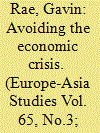

|
|
|
|
|
| Publication |
2013.
|
| Summary/Abstract |
Although liberalism has been the dominant economic ideology in post-communist Poland, liberal parties have tended to struggle to win political majorities. After winning the 2011 parliamentary elections, Citizens' Platform (Platforma Obywatelska) became the first party in Poland's democratic history to win two consecutive elections. Despite its liberal ideological background, Platforma Obywatelska took a more pragmatic and cautious approach to economic policy, avoiding the introduction of strong austerity economic policies. This paper considers the debate within the liberal camp about Platforma Obywatelska's economic policies, with particular reference to the reform of pensions. It also looks at the plans of the government for more strident liberal economic reforms in its second term, at what impact these will have on the popularity of Platforma Obywatelska and at how this reflects a tension between the party's pragmatic concerns of government and commitment to liberal ideology.
|
|
|
|
|
|
|
|
|
|
|
|
|
|
|
|
| 3 |
ID:
120668
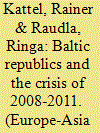

|
|
|
|
|
| Publication |
2013.
|
| Summary/Abstract |
This essay explores how the Baltic republics responded to the crisis of 2008-2011. We argue that while there are significant differences in how the Baltic economies responded to the crisis, these responses not only remain within the neo-liberal policy paradigm characteristic of the region from the early 1990s, but that the crisis radicalised Baltic economies and particularly their fiscal stance. We show that there are a number of unique features in all three Baltic republics' political economies that made such a radicalisation possible. However, these unique features make it almost impossible for the Baltic experience to be replicable anywhere else in Europe.
|
|
|
|
|
|
|
|
|
|
|
|
|
|
|
|
| 4 |
ID:
120670
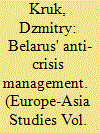

|
|
|
|
|
| Publication |
2013.
|
| Summary/Abstract |
The response of Belarus to the global economic crisis was shaped by a number of distinctive features of the Belarusian economy and of the economic policies implemented before the crisis. The specifics of anti-crisis management in Belarus resulted in a distribution of output losses for a number of subsequent periods and delayed recession. The scenario of stabilisation policies in Belarus can therefore be regarded as ineffective. The core reasons for this are an inappropriate choice of policy instruments and delayed exit from stabilisation policy. It is argued that this policy mix has long-term implications, including worsening economic growth prospects.
|
|
|
|
|
|
|
|
|
|
|
|
|
|
|
|
| 5 |
ID:
120673
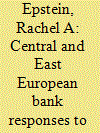

|
|
|
|
|
| Publication |
2013.
|
| Summary/Abstract |
In the context of transition, nine out of the 10 post-communist countries that ultimately joined the European Union reluctantly privatised the bulk of their banking sectors with foreign capital. The financial crisis of 2008-2009 therefore sparked fears that foreign banks would remove their operations from their Central and East European markets because of a 'home bias' in lending. Such fears were predicated on the widely held beliefs that banks' loyalties lie with their home markets and that it is therefore desirable to protect domestic bank ownership to help combat an economic downturn. This essay casts doubt on the value of banking sector protectionism by comparing foreign and domestic bank behaviour in Central and Eastern Europe during the crisis. The essay finds no consistent relationship between domestic control and either limited economic vulnerability or countercyclical lending.
|
|
|
|
|
|
|
|
|
|
|
|
|
|
|
|
| 6 |
ID:
120671


|
|
|
|
|
| Publication |
2013.
|
| Summary/Abstract |
By triggering a wave of organisational restructuring, reconfiguration of supply chains and consolidation of business processes at multinational companies, the crisis offered significant upgrading opportunities for peripheral actors in globalised production networks (the so-called global value chains). Drawing on Hungarian case studies of local subsidiaries in the automotive and electronics industries, this essay investigates the crisis-induced product, process and functional upgrading opportunities in low-cost locations. We show Hungary's high level of integration into global value chains and document the rapidly ongoing process of functional upgrading.
|
|
|
|
|
|
|
|
|
|
|
|
|
|
|
|
| 7 |
ID:
120666


|
|
|
|
|
| Publication |
2013.
|
| Summary/Abstract |
The financial and economic crisis in the Central and East European countries raised the profile of economic policy themes that relate to the role of taxation and state spending. The key policy differences related to public budgets and support for a demand stimulus. Responses fall broadly into two categories that we link to a social-democratic and a neo-liberal response. The distinction indicates that the policy responses were linked to the party affiliation of the government on the left-right spectrum. There were some remarkable common trends that cannot be explained by the logical requirements of the economic situation alone. There are differences in timing and in severity, but every country has at some point moved towards a policy of balancing the budget by making cuts. In all cases there were cuts in benefits for marginal groups in society and a switch towards indirect rather than direct taxes. These carry clear distributional implications.
|
|
|
|
|
|
|
|
|
|
|
|
|
|
|
|
| 8 |
ID:
120675


|
|
|
|
|
| Publication |
2013.
|
| Summary/Abstract |
Political risk-risk that investments are damaged by policy action of authorities-increased during the financial crisis due to controversies about the distribution of accumulated losses among stakeholders. Authorities interconnected by cross-border banks considered unilateral policies that minimised losses for domestic stakeholders at the expense of their foreign counterparts. This is at odds both with the assumption behind financial integration which presumes multilateral responses to cross-border shocks and with the typical definition of political risks that ignores the fact that not only host-country, but also home-country authorities can create such risks. This paper recasts the definition of political risk and reviews instances when political risk materialised within the EU banking market between 2007 and 2011. The analysis reveals that the EU regulatory framework needs to be enhanced to contain resurgent political risks systematically rather than through ad hoc interventions of the EU and international bodies.
|
|
|
|
|
|
|
|
|
|
|
|
|
|
|
|
| 9 |
ID:
120669


|
|
|
|
|
| Publication |
2013.
|
| Summary/Abstract |
Russia's recovery from the deep economic crisis it experienced in 2008-2009 did not deliver clear political dividends for the Russian leadership. This is because of the context in which the crisis occurred and the way that the leadership, particularly President Medvedev, and many of its critics described the crisis. The oil-fuelled boom that preceded the crisis had the effect of deepening it. Economic recovery based on rising energy prices looks like a failure, rather than a success, and highlights the underlying structural problems of the Russian economy. Arguments about the need for modernisation from within government exacerbated this perception. This seems to have weakened the connection between approval for the leadership and economic growth, a staple of pre-crisis politics.
|
|
|
|
|
|
|
|
|
|
|
|
|
|
|
|
| 10 |
ID:
120665


|
|
|
|
|
| Publication |
2013.
|
| Summary/Abstract |
THE ECONOMIC CRISIS OF 2008, STARTING FROM THE CRISIS in banking in the USA, affected economic and political development in varied ways around the world. This collection covers the impact and policy responses in the former state socialist countries of Central and Eastern Europe and the Commonwealth of Independent States (CIS). Taken as a whole, the economies of the former state socialist countries-frequently still referred to for convenience as transition economies-were hit hard by the crisis, suffering falls in GDP in 2009 that were deeper than the average around the world. However, there was considerable variety in the effects on individual countries, with a few continuing to grow while some others suffered quite exceptional falls in output. Policy responses were also quite diverse and do not obviously fit with the nature and severity of economic factors. The more general impacts on political life were also varied. In many cases very much the same governments continued in power, while in others there were significant changes and signs of a growing instability in party and political structures.
|
|
|
|
|
|
|
|
|
|
|
|
|
|
|
|